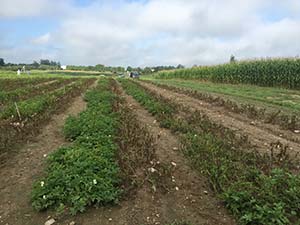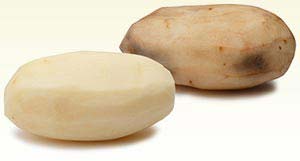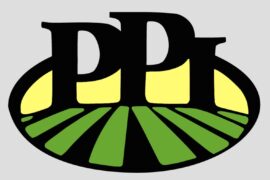The Maine Board of Pesticides Control on May 12 unanimously approved the registration of three varieties of second generation bioengineered Innate® potatoes developed by J.R. Simplot Co. According to the Bangor Daily News, this means that the Boise, Idaho-headquartered company’s “Russet Burbank, Ranger Russet and Atlantic potatoes could be planted in Maine fields at any time.”
The decision in Maine came several months after the US Environmental Protection Agency (EPA) and Food and Drug Administration (FDA) completed independent reviews and granted registrations and clearances for the tubers to be grown and sold in the United States. The three varieties had previously been deregulated by the USDA.
 Simplot’s Innate® Generation 2 potatoes fared well in this field where conventional tubers were infected with late blight disease during a trial conducted by Michigan State University in October of 2016. Simplot has been promoting Innate Gen. 2 spuds as “having significant benefits to growers, processors and consumers with reduced bruising and black spots; reduction of the natural chemical compound asparagine; protection from late blight pathogens; and enhanced cold storage capability. These benefits were achieved through biotechnology by adapting genes only from wild and cultivated potatoes.”
Simplot’s Innate® Generation 2 potatoes fared well in this field where conventional tubers were infected with late blight disease during a trial conducted by Michigan State University in October of 2016. Simplot has been promoting Innate Gen. 2 spuds as “having significant benefits to growers, processors and consumers with reduced bruising and black spots; reduction of the natural chemical compound asparagine; protection from late blight pathogens; and enhanced cold storage capability. These benefits were achieved through biotechnology by adapting genes only from wild and cultivated potatoes.”
Late blight, a major contributing factor for the 19th century Irish potato famine, is caused by a fungus-like pathogen that still has the potential to devastate world potato crops. Second generation Innate potatoes were created by introducing a gene from a South American wild potato species that provides natural protection against certain strains of the pathogen.
Simplot estimates that the late blight protection trait can result in as much as a 50% reduction in fungicide applications used to control the disease annually. Less asparagine means that accumulation levels of acrylamide can be reduced by up to 90% when these potatoes are cooked at high temperatures to make french fries and other value-added products. In addition, lowered reducing sugars enable cold storage at 38°F for more than six months without the build-up of sugars, which maintains high quality.
 Based on academic estimates from the American Journal of Potato Research, it is believed that late blight disease contributes to 5% in-field yield loss and 1.7% storage loss each year in the United States, which is the equivalent of 71,000 acres or 1.4 billion wasted pounds. In addition, according to Simplot, “late blight protection similar to Innate could result in the reduction of 1.2 million acre applications of fungicides overall.”
Based on academic estimates from the American Journal of Potato Research, it is believed that late blight disease contributes to 5% in-field yield loss and 1.7% storage loss each year in the United States, which is the equivalent of 71,000 acres or 1.4 billion wasted pounds. In addition, according to Simplot, “late blight protection similar to Innate could result in the reduction of 1.2 million acre applications of fungicides overall.”
 Comparison of a peeled Innate® Russet Burbank potato (foreground) to a conventional peeled Russet Burbank after 30 minutes shows that it stays whiter longer after the skin has been removed.“The Innate Gen. 2 potato is the most significant advancement to date in fighting late blight disease in North America,” said David Douches, Ph.D., professor and director of the Potato Breeding and Genetics Program at Michigan State University. “Since late blight disease impacts both organic and conventional potato crops on a commercial scale and must be treated with fungicides, Innate provides the opportunity for a significant reduction.”
Comparison of a peeled Innate® Russet Burbank potato (foreground) to a conventional peeled Russet Burbank after 30 minutes shows that it stays whiter longer after the skin has been removed.“The Innate Gen. 2 potato is the most significant advancement to date in fighting late blight disease in North America,” said David Douches, Ph.D., professor and director of the Potato Breeding and Genetics Program at Michigan State University. “Since late blight disease impacts both organic and conventional potato crops on a commercial scale and must be treated with fungicides, Innate provides the opportunity for a significant reduction.”
It remains to be seen if farmers in Maine will begin devoting significant acreage to the cultivation of second generation Innate potatoes to mitigate the effects of late blight while simultaneously reducing the application of fungicides in fields.
One Mainer firmly opposed to the introduction of genetically engineered crops in his state is Jim Gerritsen, who grows organic seed potatoes at Wood Prairie Family Farm in Bridgewater.
“These GMO potatoes run the very strong risk of depressing demand for potatoes of all types, both organic and conventional,” he stated. “There’s a growing body of evidence that consumers do not want genetically engineered food. What I worry about is that there will be a vague recollection that new potatoes will be genetically engineered. That’s going to damage every potato farmer – not just organic ones, but regular ones too.”





